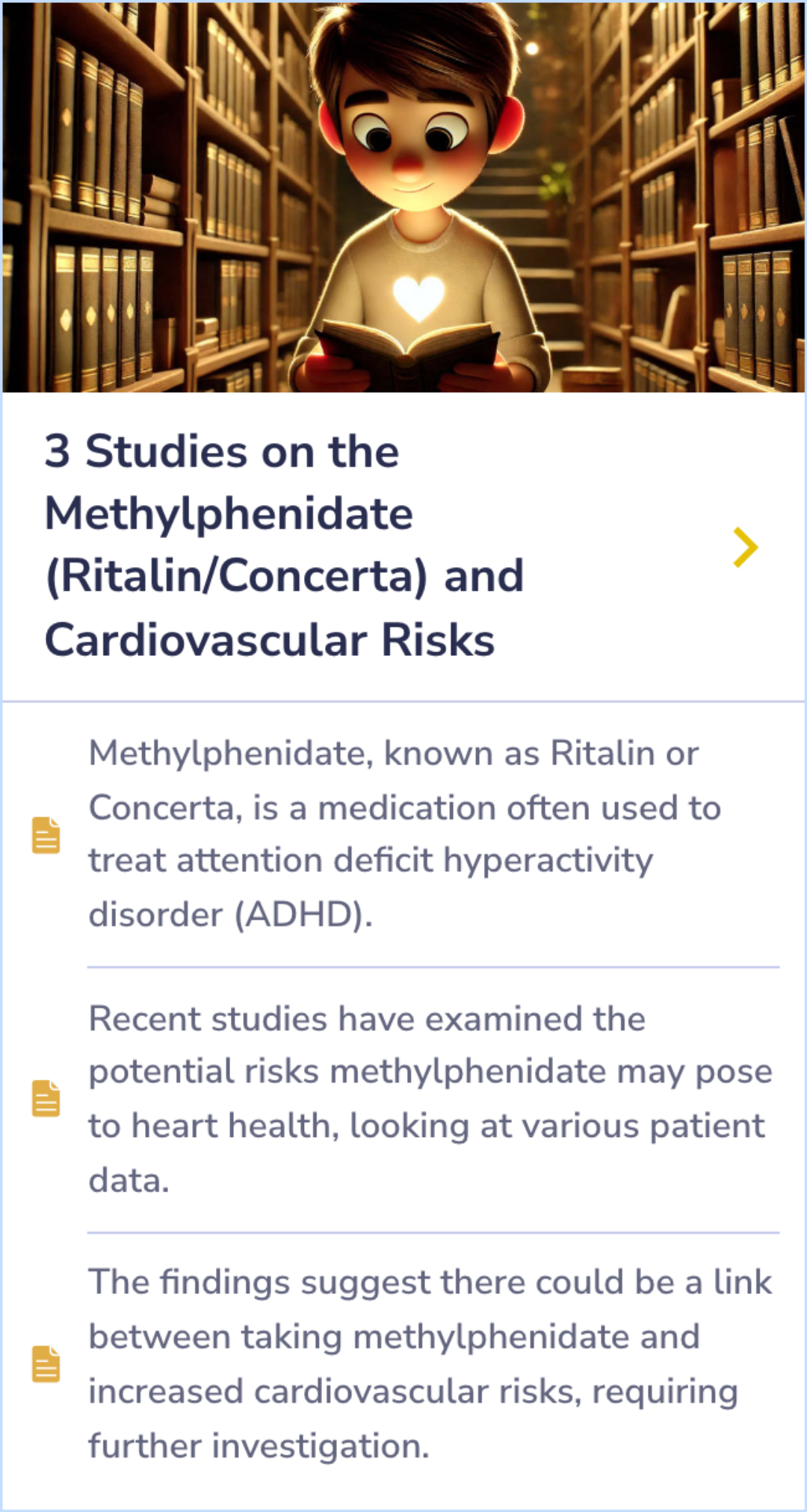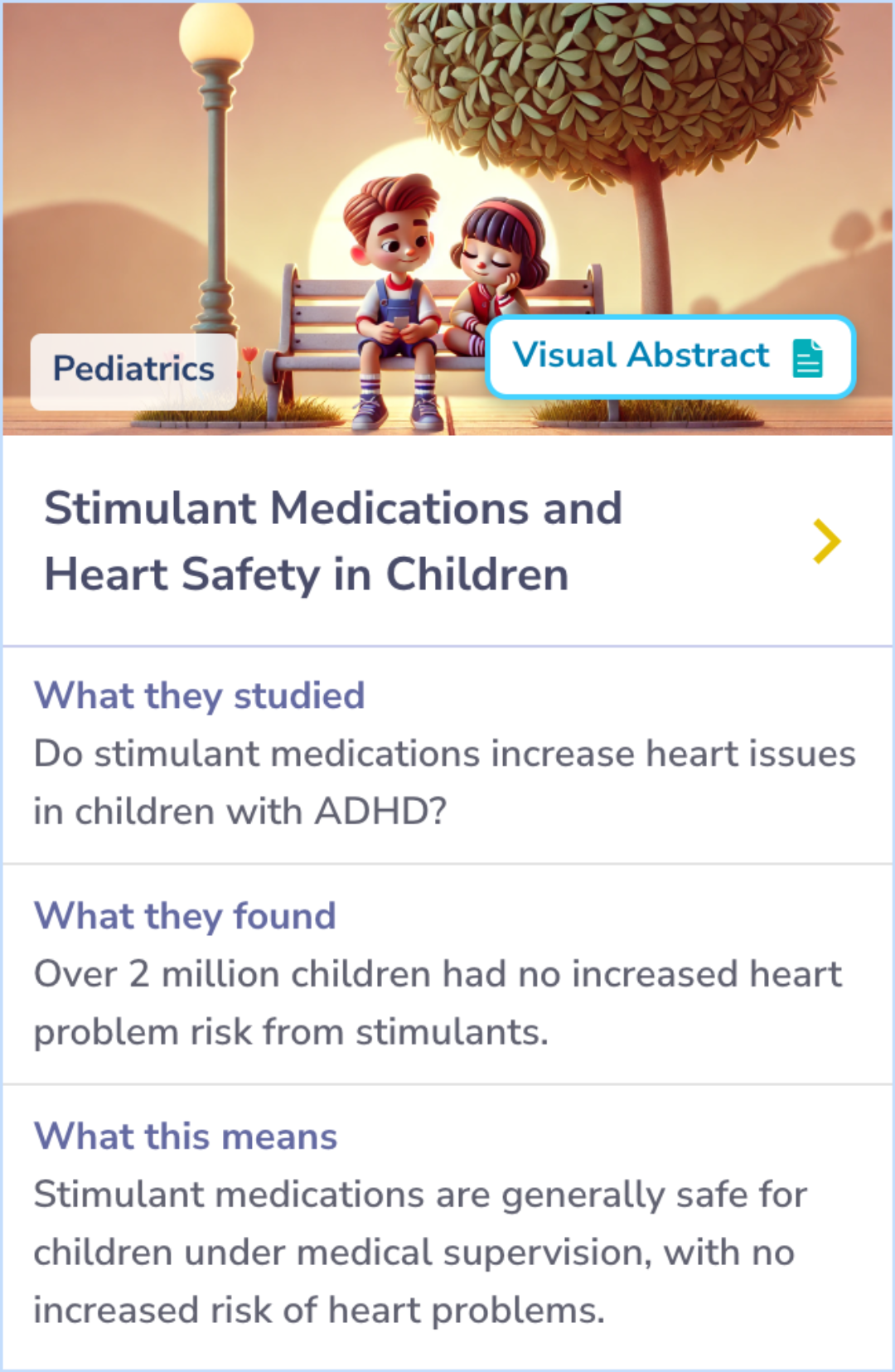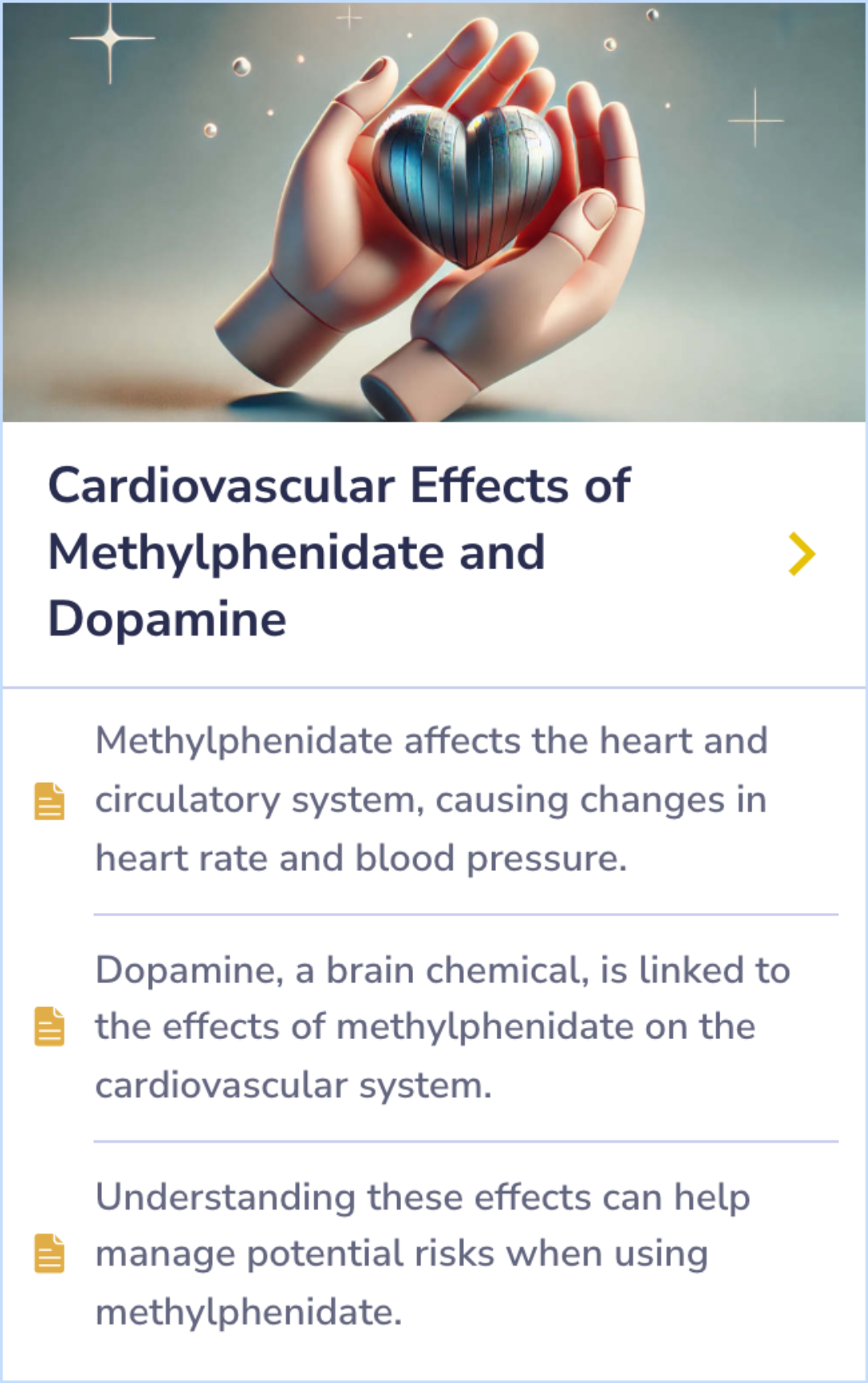Ritalin
Evidence Based Answers
Can Ritalin cause a heart attack?
Taking Ritalin without ADHD might enhance focus temporarily but poses risks like increased heart rate and blood pressure, especially in those with pre-existing heart issues.
Published: November 8, 2024
Click to explore a section:
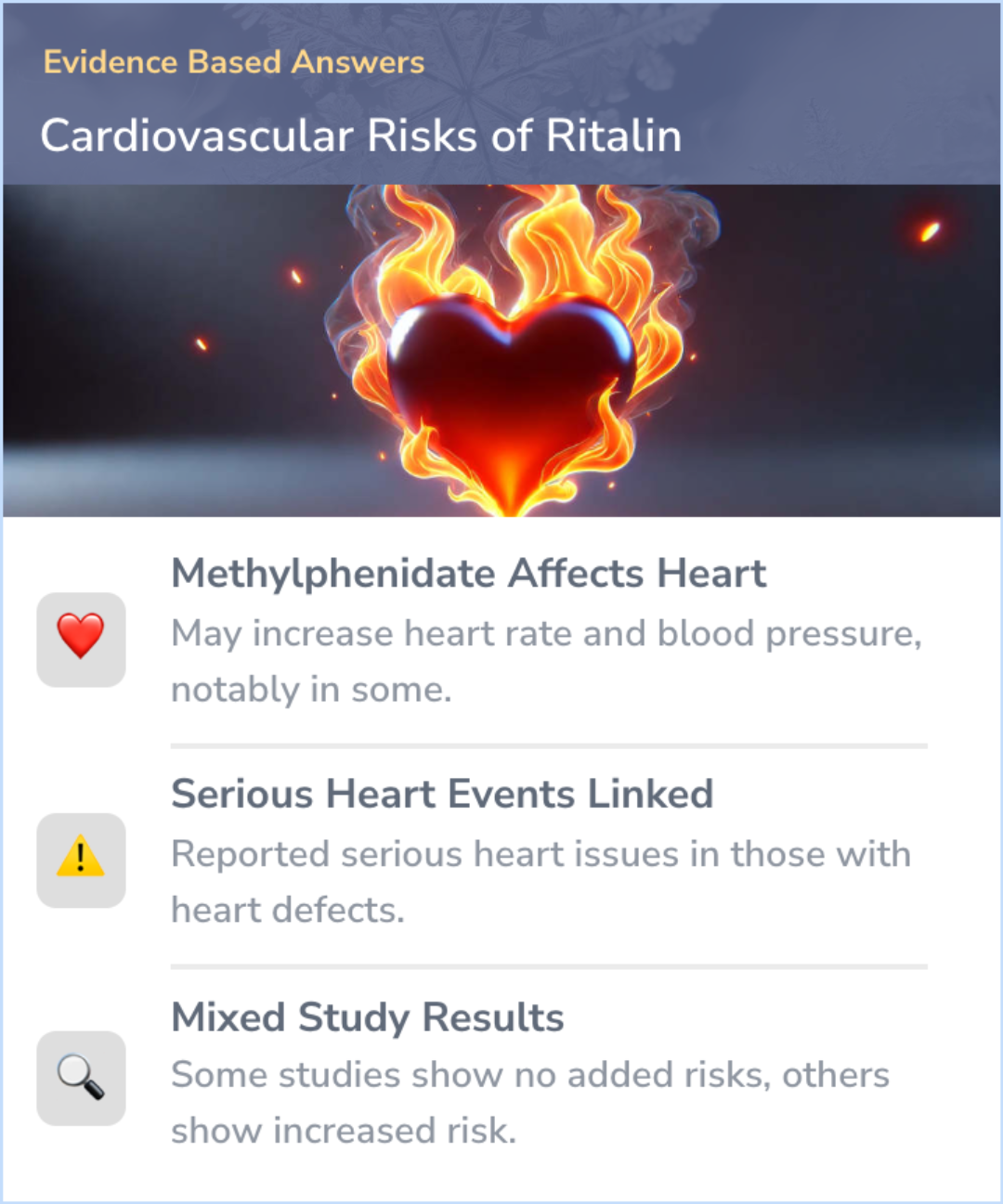
Methylphenidate can slightly raise heart rate and blood pressure and may lead to serious events in individuals with heart defects.
Background: Warnings
Ritalin, a stimulant medication, can lead to cardiovascular issues including increasing the risk of stroke or heart attacks in adults, particularly those with existing heart problems. Furthermore, stimulants like Ritalin can elevate both heart rate and blood pressure, potentially impacting cardiovascular health.
Individuals experiencing chest pain or fainting while on such medications are advised to seek medical attention immediately.
Individuals experiencing chest pain or fainting while on such medications are advised to seek medical attention immediately.
Background: Methylphenidate's Effects on Heart Rate and Blood Pressure
Ritalin (methylphenidate) can lead to modest increases in heart rate and blood pressure, typically by about 2-4 mmHg for blood pressure and 3-6 beats per minute for heart rate. While these changes are generally small, patients with pre-existing heart conditions may be at risk for larger increases, necessitating regular monitoring.
Healthcare providers recommend keeping track of vital signs during treatment, particularly for those with a history of hypertension, heart failure, or arrhythmia, as methylphenidate may elevate these metrics.
Healthcare providers recommend keeping track of vital signs during treatment, particularly for those with a history of hypertension, heart failure, or arrhythmia, as methylphenidate may elevate these metrics.
“
Source Quotes:
Stimulant medications cause a modest increase in average blood pressure (about 2-4 mmHg) and average heart rate (about 3-6 bpm), and individuals may have larger increases.,While the mean changes alone would not be expected to have short-term consequences, all patients should be monitored for larger changes in heart rate and blood pressure.
The main vitals to note at each visit are blood pressure and heart rate, especially in patients with underlying hypertension, heart failure, a recent MI, or ventricular arrhythmia, as slight elevations can occur with methylphenidate use.
Background: Serious Cardiovascular Risks Associated with Methylphenidate
Reports have linked methylphenidate use to sudden death, stroke, and heart attacks, primarily in individuals with pre-existing heart defects. This underscores the need for thorough cardiovascular assessments before starting treatment.
While a direct causal relationship between methylphenidate and these severe outcomes remains unclear, caution is advised, particularly for those with known heart issues or structural abnormalities.
While a direct causal relationship between methylphenidate and these severe outcomes remains unclear, caution is advised, particularly for those with known heart issues or structural abnormalities.
“
Source Quotes:
Sudden death has been reported in association with CNS stimulant treatment at usual doses in children and adolescents with structural cardiac abnormalities or other serious heart problems.,Sudden death, stroke, and myocardial infarction have been reported in adults taking stimulant drugs at usual doses for ADHD.
It is important to note that there have been reported cases of sudden death in both children and adults with a pre-existing structural cardiac abnormality.
Background: Conflicting Evidence on Cardiovascular Risks
Research on the link between methylphenidate and major cardiovascular events shows mixed findings. Some studies, such as Habel et al. (2011), have not found an increased risk of heart attacks, sudden death, or stroke.
Conversely, other studies indicate elevated risks for conditions like abnormal heart rhythms and strokes in specific populations, emphasizing the influence of individual factors on cardiovascular outcomes.
Conversely, other studies indicate elevated risks for conditions like abnormal heart rhythms and strokes in specific populations, emphasizing the influence of individual factors on cardiovascular outcomes.
“
Source Quotes:
Methylphenidate was repeatedly shown to increase heart rate and blood pressure (Coghill et al. 2013; Epstein et al. 2014; Martinez-Raga et al. 2013), yet it remains unclear whether adult individuals treated with MPH are at significantly higher risk of serious cardiovascular events.,While Habel et al. (2011) found no evidence for increased risk of myocardial infarction (MI), sudden cardiac death (SCD), or stroke, a corresponding trial by Schelleman et al. (2012) reported significantly higher rates of SCD/ventricular arrhythmias and stroke in a sample of patients treated with MPH.
Background: The Importance of Cardiovascular Screening Before Use
Before beginning methylphenidate, patients should undergo comprehensive heart screenings. This includes reviewing medical and family history, especially if there is a known risk of heart conditions.
For patients with underlying cardiovascular issues, stimulant medications can heighten existing risks, making regular monitoring of heart health essential.
For patients with underlying cardiovascular issues, stimulant medications can heighten existing risks, making regular monitoring of heart health essential.
“
Source Quotes:
Children, adolescents, or adults who are being considered for treatment with stimulant medications should have a careful history (including assessment for a family history of sudden death or ventricular arrhythmia) and physical exam to assess for the presence of cardiac disease.
Monitor patients for changes in heart rate and blood pressure and use with caution in patients for whom an increase in blood pressure or heart rate would be problematic.
Peer Reviewed Study
Study: Methylphenidate and Cardiovascular Risk
Studies indicate that methylphenidate (Ritalin) may be associated with a higher risk of sudden death or ventricular arrhythmia, reflected by a hazard ratio of 1.84.
Comparing high vs. low doses of methylphenidate, the risk for sudden death remains similar, while lower risks for myocardial infarction and combined stroke/heart attack outcomes were observed.
Methylphenidate users also showed a higher hazard ratio for all-cause death compared to the general population.
Comparing high vs. low doses of methylphenidate, the risk for sudden death remains similar, while lower risks for myocardial infarction and combined stroke/heart attack outcomes were observed.
Methylphenidate users also showed a higher hazard ratio for all-cause death compared to the general population.
author
Schelleman H, Bilker WB, Kimmel SE, Daniel GW, Newcomb C, Guevara JP, Cziraky MJ, Strom BL, Hennessy S
journal
Am J Psychiatry
Date Published
February 2012
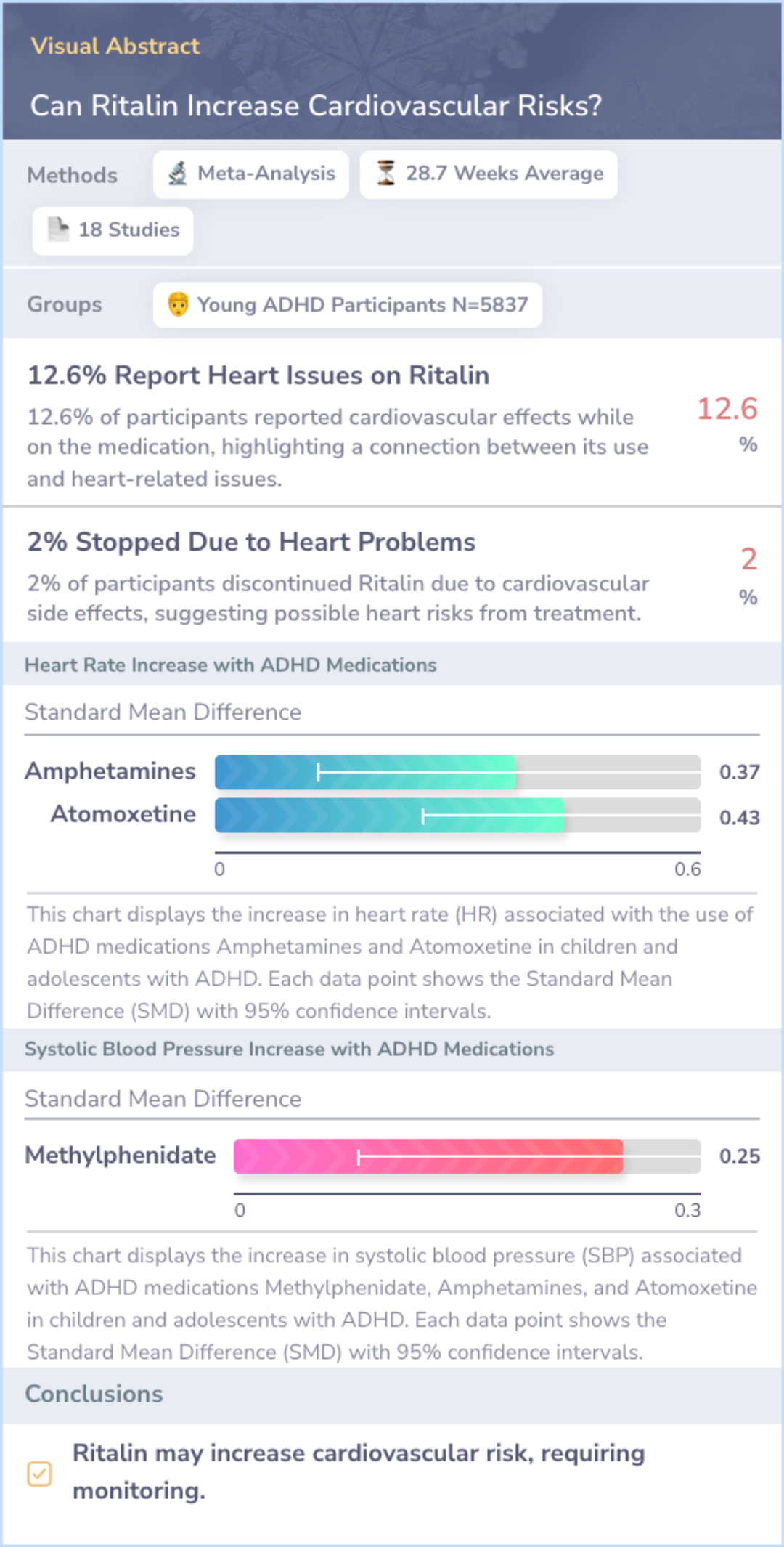
Peer Reviewed Study
Study: Ritalin and Cardiovascular Risk
Studies show that 12.6% of participants on Ritalin reported experiencing cardiovascular effects, while 2% discontinued use due to heart issues.
Additionally, ADHD medications such as Methylphenidate (Ritalin), amphetamines, and Atomoxetine have been associated with increases in heart rate and blood pressure.
These findings highlight the importance of monitoring heart health while on ADHD medications.
Additionally, ADHD medications such as Methylphenidate (Ritalin), amphetamines, and Atomoxetine have been associated with increases in heart rate and blood pressure.
These findings highlight the importance of monitoring heart health while on ADHD medications.
author
L Hennissen, MJ Bakker, T Banaschewski, S Carucci, D Coghill, M Danckaerts, RW Dittmann, C Hollis, H Kovshoff, S McCarthy, P Nagy, E Sonuga-Barke, IC Wong, A Zuddas, E Rosenthal, JK Buitelaar
journal
CNS Drugs
Date Published
2017-03

Key Takeaways
Conclusions
Methylphenidate, the active ingredient in Ritalin, is linked to increased heart rate and blood pressure, yet the effect is typically slight. This also contextualizes ongoing concerns about the potential for serious heart events, unlikely unless preexisting heart conditions are present.
Research offers varied perspectives: some studies indicate no heightened risk of heart attacks or sudden death, while others highlight potential risks like abnormal heart rhythms. Heart health assessment prior to Ritalin use is advisable, especially considering how risks may vary with age.
Research offers varied perspectives: some studies indicate no heightened risk of heart attacks or sudden death, while others highlight potential risks like abnormal heart rhythms. Heart health assessment prior to Ritalin use is advisable, especially considering how risks may vary with age.

Evidence Summary
Exploring Heart Health Risks with Methylphenidate
Recent studies are exploring the potential cardiovascular risks associated with methylphenidate, a medication commonly used to treat ADHD. Data from these studies indicate there might be a connection between methylphenidate use and increased risks to heart health.
Methylphenidate, known by brand names like Ritalin and Concerta, is undergoing closer scrutiny as researchers analyze patient data to uncover whether there’s a significant impact on heart rate, blood pressure, and other cardiovascular markers.
Ongoing investigations aim to clarify how methylphenidate affects the heart, especially considering its influence on dopamine and related neurotransmitters.
Methylphenidate, known by brand names like Ritalin and Concerta, is undergoing closer scrutiny as researchers analyze patient data to uncover whether there’s a significant impact on heart rate, blood pressure, and other cardiovascular markers.
Ongoing investigations aim to clarify how methylphenidate affects the heart, especially considering its influence on dopamine and related neurotransmitters.
Evidence Summary
Comparing Cardiac Safety of ADHD Stimulants in Youth
This study tracked over two million children with ADHD to compare cardiac event risks between two common stimulant medications. Using data from Medicaid, researchers followed young users of methylphenidate and amphetamine salts to monitor emergency room visits for heart-related symptoms.
After accounting for health history, the findings showed that current users of either stimulant had no higher risk for cardiac issues than past users, indicating similar safety profiles for these medications.
After accounting for health history, the findings showed that current users of either stimulant had no higher risk for cardiac issues than past users, indicating similar safety profiles for these medications.
Evidence Summary
Methylphenidate's Impact on Heart Health
Methylphenidate can significantly influence heart function, specifically by affecting heart rate and blood pressure. As it interacts with dopamine—a neurotransmitter in the brain—these changes can be particularly notable in individuals with existing cardiovascular issues. Monitoring these vital signs becomes essential, especially for those with pre-existing conditions, ensuring that potential cardiovascular risks are kept in check.
This medication's impact on the circulatory system highlights the importance of awareness around its effects. The relationship between dopamine and cardiovascular responses further emphasizes the need for careful management during treatment.
This medication's impact on the circulatory system highlights the importance of awareness around its effects. The relationship between dopamine and cardiovascular responses further emphasizes the need for careful management during treatment.
